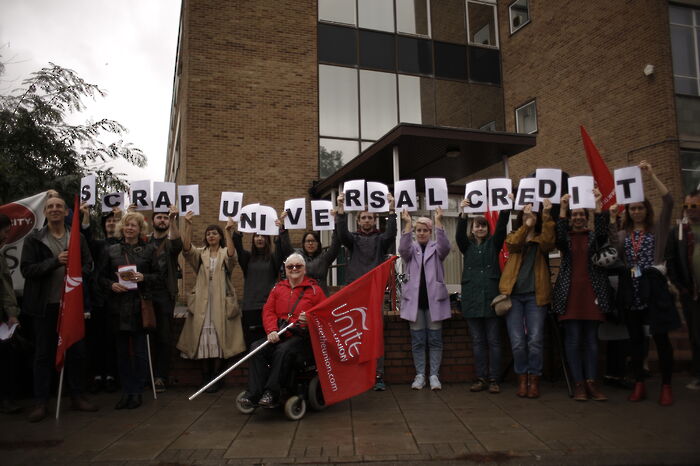Universal Credit isn’t a distant issue – its effects will be severe in Cambridge
Lara Parizotto argues that the continuation of Universal Credit will have severe implications for social mobility and access to top universities in the future

As Universal Credit is rolled out in Cambridge, the impacts of this policy must be of concern to us all. Access is a key concern within our University; if we really want to mean what we say, Universal Credit must be part of that conversation.
Universal Credit is a benefit combining six of our legacy benefits, including Child Tax Credit, Housing Benefit and Income Support, but it achieves no practical improvements. There has been much said about the ‘efficiency’ benefits that could come from Universal Credit. An important goal of the scheme is ending the complexities of the current benefit system, to which I am not opposed. But Universal Credit is simply not addressing the issues it claims to be tackling – it is in fact creating new problems.
Despite the claims of the Secretary of State, Esther McVey, the National Audit Office has reported that it is not possible to measure whether Universal Credit leads to higher employment rates. It is already more expensive than the old system, costing £1.9 billion to get 800,000 people onto Universal Credit – and we are barely halfway there. Meanwhile, its rollout is to be delayed once again, and yet the Government is still content to continue with this policy.
“Access is a key concern within our University; if we really want to mean what we say, Universal Credit must be part of that conversation”
On a human level the cost is desperate. The average claimant is in £1400 rent arrears, with late payments all too common, some councils have been owed up to £8 million. These rent arrears lead to eviction letters being sent out to vulnerable people, the same ones ending up on our streets. Foodbanks are another indicator: the Trussell Trust states that in 2017, 1 Million people relied on 3-day emergency food supplies nationally, marking a 13% increase on the previous year.
Working as a caseworker in an area of full Universal Credit roll-out, I observed its personal and political impacts. I listened to a teenage girl ask for help for her mum who was struggling to pay rent because of Universal Credit. Sitting there looking at copies of documents to try and help, I realised that all I could realistically do was ask the DWP for one more reassessment.
This was the same girl who should now be thinking of applying to university, not worrying whether Universal Credit will be paid in time. How can we realistically expect that our outreach schemes will be sufficient in convincing students all over the country that they should apply to Cambridge if our current welfare system cannot even support them through primary and secondary school? Future generations growing up in poverty and students who need extra support will be shut out of our educational institutions.
How can we expect underfed children to do well in early-years education? How can we expect them to concentrate and do their homework well when they have no secure place to live? It seems that asking these questions rhetorically is all we can do. The Government is not interested in statistics or stories. We have seen Conservative MPs crying in Parliament because of the effects of Universal Credit, and somehow the juggernaut ploughs on.
If the future is bleak, the present is no better. Disabled students are affected by Universal Credit as they are being cut off from money essential to their extra living costs associated with their disabilities. Universal Credit, as it stands, does not automatically treat disabled students as having a “limited capability for work” a criteria that prior to Universal Credit entitled students, especially part-time students, to access Employment and Support Allowance (ESA) and Housing Benefit during their studies. The new rules will only consider extremely severe circumstances such as receiving treatment for cancer as “limited capability for work”. Mature students with children, especially single parents, should also not be cut out from further education, but reports have shown that single parents lose out an average of £1,350 a year with Universal Credit. Education should never be made inaccessible because of a poorly-designed welfare system and yet, that is what many students may now experience.
Worryingly, this system is indicative of the state of the welfare system in the UK and the financial support offered to students of all backgrounds. Costs are up. That much we know and experience everyday when the cost of our accommodation increases alongside the cost of food, travel and course materials. Nevertheless, maintenance grants are scrapped and loans are not sufficient. The burden of applying for further bursaries and scholarships once again falls on the student, that same student whose mental health is worsened because of the stress of having to balance an intense academic career with the everyday financial strains of university life.
Just like people all across the country have to ‘prove’ their physical and mental disabilities or their lack of stable income caused by zero hour contracts to receive Universal Credit, our students are required to relive often traumatic experiences of family estrangement or spend hours on endless forms just so that they can access the most basic level of support that should be readily available for all.
As students, we must resist and campaign for a stop and scrap of Universal Credit. This policy is already causing misery and hardship to members of our society and I do not want to see it being rolled out further in Cambridge. I dread to think what more could happen to the most unequal city in the UK.
 Comment / Plastic pubs: the problem with Cambridge alehouses 5 January 2026
Comment / Plastic pubs: the problem with Cambridge alehouses 5 January 2026 News / Cambridge businesses concerned infrastructure delays will hurt growth5 January 2026
News / Cambridge businesses concerned infrastructure delays will hurt growth5 January 2026 News / Cambridge academics stand out in King’s 2026 Honours List2 January 2026
News / Cambridge academics stand out in King’s 2026 Honours List2 January 2026 News / AstraZeneca sues for £32 million over faulty construction at Cambridge Campus31 December 2025
News / AstraZeneca sues for £32 million over faulty construction at Cambridge Campus31 December 2025 Interviews / You don’t need to peak at Cambridge, says Robin Harding31 December 2025
Interviews / You don’t need to peak at Cambridge, says Robin Harding31 December 2025










